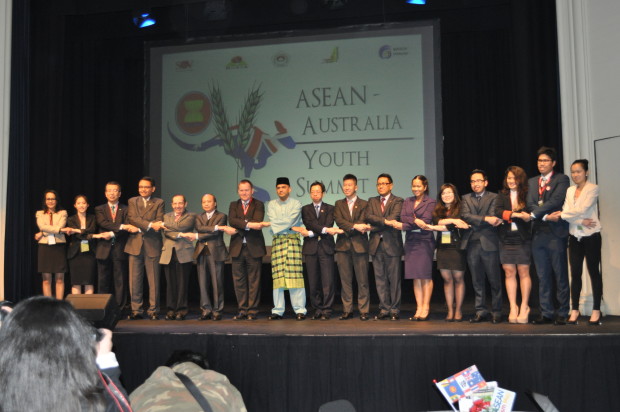Igniting young minds: 2013 ASEAN-Australia Youth Summit
DEBATING regional issues, exchanging ideas and developing friendships – all this in a day’s work for the bright minds gathered at this year’s ASEAN-Australia Youth Summit. Nkandu Mwenge reports.
Young change-makers gathered in Melbourne on August 24 for the second annual ASEAN-Australia Youth Summit, held at the Melbourne Town Hall.
Building on the success of last year’s inaugural summit, the event was a meeting between student leaders, ASEAN representatives, academia, business and industry experts, as well as members from civil society and prominent NGOs.
In his opening remarks, former director of ASEAN Cooperation Bagas Hapsoro said ASEAN youths are critical for helping to unleash the potential of more than six- hundred million people in the region.
He told ASEAN and Australian youth leaders that “the ignited mind of the youth is the most powerful resource on earth…(and) could bring about transformational change in humanity for its progress.”
In addition to presentations from prominent figures working in the field of ASEAN-Australia relations, this year’s summit included participatory sessions for delegates to discuss regional issues. Delegates also took part in networking and were treated to South East Asian cultural performances.
Seeking solutions for regional issues
The first ASEAN-Australia Youth Summit last year saw delegates discussing ways to meet the region’s education objectives, as well as ways ASEAN students could help strengthen the relations between ASEAN and Australia.
The focus this year was on regional human security challenges, economic trade and business links between ASEAN and Australia. Each of these themes was explored through facilitated discussions of various related topics, which ranged from economic integration and sustainable development to refugees, human security, and public health.
Throughout the sessions, a number of challenges were identified. These include the widening gaps between the rich and poor, unequal rates of development, as well as corruption and protectionist trade policies.Guided by experts in these fields, delegates were asked to propose solutions for contemporary challenges facing the region.
In one session, there was robust debate on whether trade liberalisation would have a positive impact on the economies of ASEAN member states, with some arguing it would favour larger economies and lead to industry closures in smaller economies. The delegates proposed punitive anti-corruption laws, collaborative legal reform and policies that would protect industries in smaller economies.
The event was favourably received by the delegates. Vice-president of Singaporeans in Victoria, Chun Ting Yen, said she found the 2013 Summit to be a good initiative for broadening the perspectives of the attendees and helping them develop a better understanding of other ASEAN countries.
For further information about the ASEAN-Australia Youth Summit, visit their website.



